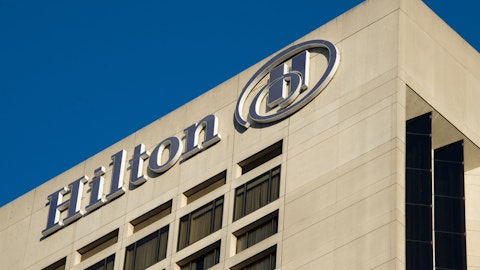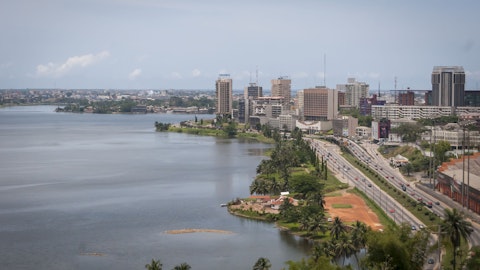Operator: The next question comes from Bill Crow with Raymond James. Please go ahead. Mr. Crow your line is open.
Chris Nassetta: Hey Bill, are you there?
Bill Crow: I’m sorry, Chris. Good morning.
Chris Nassetta: Good morning.
Bill Crow: Chris, Kevin and Jill. Quick two-parter on maybe the last question, I’m not for today.
Chris Nassetta: A lot in that question.
Bill Crow: Well, a couple of specific questions. First of all, the headlines surrounding Country Garden in China are getting any better. And I’m just wondering as it regards the pipeline as opposed to the already constructed and opening units, what do you think the risk is to that pipeline as you stand today? The second part of the question is more specific on the key money, and we understand the hotel you’re going to announce the conversion on tomorrow is in Boston, the reports are circulating that’s a $40 million key money payment. I’m just trying to figure out the economic state out of payment like that.
Chris Nassetta: Let me — I’ll maybe tackle both Kevin can jump in. On Country Garden, it is not a huge component of our overall pipeline yet in China. And so I don’t feel like there’s any risk. And certainly, the guidance we’re giving you on NUG anticipates what we think conservatively will happen there. Having said, Country Garden obviously has a lot of issues, but this venture is a totally separate entity apart from their residential business. They remain very committed to it. They have very rigorous milestones that they have to meet in order to keep the exclusivity with Home2. And if they don’t, we have all sorts of options that we could move forward on doing it ourselves, et cetera, et cetera. So, Home2 is very well received by the Chinese customer and very well received by the owner community recognizing Country Garden is not building any of these.
This is a MOA, where we’re going out with them, and these are franchisees that are doing it, and it’s not their money. It’s individual property owners, developers in all these little regions of China. And so it’s not a capital drain for them. They like it. It’s profitable, and I think they’ll stick with it. If they don’t, ultimately, we have all sorts of mechanisms. If they don’t meet the milestones, it’s not like we have to wait very long. I suspect they will — what they’re saying to me and to us is they remain very committed to it. So I think we — I think it’s fine. I think come to the key ingredient to it is super popular, super profitable on the ones that we’ve opened up in the development community just like I love Home2 in the US, the development community in China loves it.
So that means that we’re going to get a bunch of Home2s done. Hopefully, it’s with them. If it’s not, we’ll do it ourselves. On the deal we talked about without naming it, we’re not going to name it, we would have named it if we could. So we’re not going to comment on specific deals and individual key money. The way to think about it broadly is on big, complicated city center, full service or luxury, those are the deals that end up drawing — I mean being most of the key money we spend. As Kevin said, less than 10% of our deals and our pipeline by number have any form of balance sheet support. And disproportionately, it’s those kinds of deals, they’re more competitive, they’re more strategic in certain locations where we may have lesser density of distribution where it’s really important to us.
And in every single case, we are making money. I mean, we are never giving key money, and I’m not going to comment on individual deals. We’re never giving key money that doesn’t have us make — creating value in a contract that is significantly higher than the key money contribution. Obviously, that’s — we’re a for-profit business. We just don’t approach it that way. So every deal is profitable and 90%-plus of them are infinitely profitable because we put nothing into.
Operator: Ladies and gentlemen, this concludes our question-and-answer session. I would now like to turn the call back to Chris Nassetta for any closing remarks.
Chris Nassetta: Thanks, everybody, for the time today. Obviously, very pleased with Q3, but more importantly, pleased with the momentum we have going into the fourth quarter, I feel pretty good about next year. We’ll get back to you on exactly what we think as we get through our budget process. But given the macro view of what next year is going to be like and the pent-up demand, particularly in group, but also in business travel, we feel very good about it. And obviously, we talked a lot about NUG today. We tried to give you a much more granular view of that. We feel good that we’ve hit a point of inflection and we’re on the road to getting back to our 6% to 7% growth rate. So we got a busy end of the year to make all that happen and get set up for next year. We’ll get back to it, and we’ll look forward to getting back with you after the year is over.
Operator: The conference has now concluded. Thank you for your participation. You may now disconnect your lines.
Follow Hilton Worldwide Holdings Inc. (NYSE:HLT)
Follow Hilton Worldwide Holdings Inc. (NYSE:HLT)
Receive real-time insider trading and news alerts




